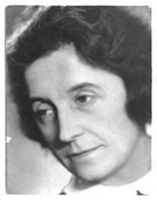Rosa Jochmann
Rosa Jochmann was a woman, who remained true to her principles and in return had to put up with jail, imprisonment and suffering. All her life she could not bear unjust treatment and also could not look on, if injustice was inflicted upon others.
She came from a destitute working class family. At the age of 15, after her mother had died, she started working in a candy factory to support her father and her siblings. She had to reach the same output as older co-workers, but earned only half of their pay. Afterwards she was employed in a cable factory, a candle factory and a manufacture of gas mantles. Soon she was elected as a member of the trade union and started to fight against unfair treatment and to improve the situation of women in the factories. Through her father, who died already in 1920 at the age of 44, she became affiliated to the Social Democratic Party.
1926 Rosa attended the Worker’s Academy in the Viennese district Döbling and belonged to the elite group of the first academic year. In 1939 her ‘Manual on Female Labour in Austria’ was published. Supported by Käthe Leichter she joined the trade union full time. Then her political career started: 1931 Central Secretary for Women, 1932 Central Secretary of Socialist Women, 1933 she was co-opted into the Party Executive Committee of the Social Democratic Labour Party SDAP.
After the fights between the pro-government and the resistance movement against growing Fascism, the SDAP was prohibited. Using an alias she continued her political work in the RS – Revolutionary Socialists. She was detected and sentenced to one year austere imprisonment for distributing illegal publications.
In March 1938 she would have had the chance to escape. However, she refused emigration and stayed in Vienna. She took on work in a Jewish textile factory, but was again arrested by the Gestapo before the outbreak of war in August 1939. In March 1940 she was deported to Ravensbrück concentration camp with the endorsement ‘return unwanted’. Through intercession of Käthe Leichter she was nominated eldest in the block and in this position became mediator between the camp authorities and the prisoners. Thereby she had the opportunity to alleviate the hardships of detention for part of the prisoners (especially children). Nevertheless, she could not prevent that Käthe Leichter was deported to Auschwitz and had to look on without being able to take action. Furthermore, she herself was also punished and inter alia had to endure six months imprisonment in darkness, deprivation of food ration and forced labour.
In spring 1945 after the liberation by Russian troops, she and many others remained in the camp to care for the sick. They waited in vain for the Austrian government to bring them back home. So Rosa set out on her own to return from Ravensbrück to Vienna. Her apartment was bombed out and for years she only had a single room to live in.
After her return she resumed her political activities in the Socialist Party and until 1967 was a member of the executive committee, where she represented the left wing of the party.
From 19.12.1945 until 6.5.1967 Rosa was delegate to the National Council. During this period her foremost concerns were the law for care of the war victims and collecting intelligence about anything connected with the period of Fascism. 1956-1967 Rosa was member of the executive committee as well as deputy of the chairman of the Socialist Party and also Party Secretary for women, and from 1959 onwards Women President.
In 1967 she resigned from all political positions and only retained the function as Chairwoman of the federation of socialist freedom fighters. She made constant efforts to keep the memory of fascist atrocities alive, gave lectures, acted as contemporary witness in schools and educational institutions, communicated her experiences at conferences at home and abroad and had discussions with young people.
All her life she was a warner against right wing extremism and anti-Semitism and demanded that active efforts should be undertaken to bring back the Austrian exiles.
Rosa Jochmann was a great personality with courage and commitment for fellow human beings even if her life was at stake.
A street, a school and a park were named after her. In 1981 she became honorary citizen of Vienna.
Translation: Ulrike Rahmatian
Sources:
- www.antifa.co.at
- www.onb.ac.at/ariadne
- www.univie.ac.at
- biographiA www.dasrotewien.at.
- www.ceiberweiber.at
Photocredits: Rosa Jochmann, author unknown.
Sources: picture archive DOEW Jochmann 1/3 with friendly permission of „Dokumentationsarchivs des Österreichischen Widerstandes“ vom 25.9. 2013 und 12.1. 2014




